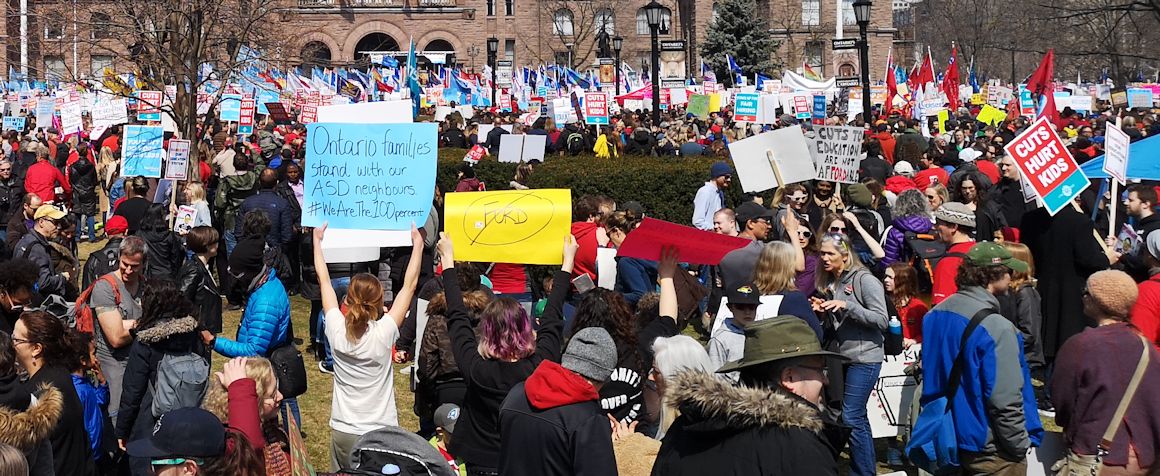In the morning of September 10, the Twitterverse exploded with 280-character celebrations, after an Ontario Superior Court judge struck down Doug Ford’s legislation cutting Toronto’s city council in half. Within hours, however, Ford had announced that he would invoke Section 33 of the Constitution, the “notwithstanding clause,” to force the legislation through.
The notwithstanding clause has rarely been used, and never by an Ontario provincial government. Naturally, everybody from pundits to profs to poodle groomers has an opinion on why Ford would reach for such an extreme legal weapon to reduce the size of Toronto’s council. Most of this discussion concludes that Doug Ford is a mean, anti-Toronto bully who is using city-bashing to maintain his populist profile.
While there is truth to Ford’s meanness and bullying, proclamations that he is guided by a subjective anti-Toronto bitterness are simplistic. To build an effective fight against the Conservative government, the working class and its allies need to recognize and understand the forces that are really driving their hard-right policies. And in the case of the attack on local democracy, it doesn’t take a lot of scratching to reveal the corporate interests lurking in the backroom.
First off, it’s important for people – especially Torontonians – to realize that Bill 5, the Better Local Government Act, isn’t just about Toronto.
The bill also cancels elections for the heads of council in the regional municipalities of Muskoka, Peel, York and Niagara, and replaces them with appointed roles. These positions are the Chief Executive Officers of huge and strategically important areas within the “Greater Golden Horseshoe” region (GGH), Canada’s largest urbanized area and the economic engine of Ontario. The GGH is home to two-thirds of the Ontario population and one-third of the total Canadian population, and the region generates two-thirds of Ontario’s and one-fifth of Canada’s GDP. The Muskoka Region, notably, is a gateway for infrastructure relating to the massive mineral wealth in Northern Ontario’s Ring of Fire. Replacing the elected heads for these regional municipalities by appointees is a huge step toward accelerating corporate access and influence over the bulk of the province’s infrastructure, services, industry, and resources.
Replacing the elected Mayor of Toronto with an appointed role is a political non-starter, even for a gang as brash as Ford Nation, but this same drive for corporate access and control is behind the move to cut Toronto’s elected council in half. In April, prior to the provincial election, the Liberal government abolished the Ontario Municipal Board (OMB) and replaced it with the Local Planning Appeal Tribunal (LPAT). Unlike the OMB, which was able to overrule local council decisions and replace them with its own, the LPAT has a much more reduced range of powers and can only refer matters back to the related council for resolution. The expectation is that the LPAT will be a key component in a development process that defers to municipal council’s democratic decisions about their local community.

Shortly after the Conservatives’ June 5 election victory, however, the always clever Ontario Chamber of Commerce intervened with its “Blueprint for making Ontario open for business.” This document provides the government with the corporate world’s comprehensive wish list for legislative changes that will increase its profit, power, and profile in all corners of Ontario. The Blueprint contains extensive discussion and itemized proposals on municipal infrastructure and asset management (read: privatization), expanded use of alternative financing and procurement (read: P3s), for changing municipal revenue and taxation tools (read: further shifting the tax burden from business to residential and individual) and changing the employer status of municipalities (read: scrapping fair wage policies and opening municipalities up to corporate tender and procurement).
None of these goals is in the interest of the vast majority of Ontarians. So, to ensure that municipal policies facilitate this kind of piracy, corporate lobbyists have pushed for years to have local councils shift from elected to appointed, from democratic to technocratic. This creates a situation in which overwhelmed councilors have no time or energy to properly monitor, let alone challenge, a staff-driven city government that is enormously vulnerable to the pressures of both corporate lobbyists and provincial political pressure.
This is precisely the type of windfall that corporations expect to achieve, and quickly, through Ford’s aggressive moves to cut Toronto city council and attack local democracy in municipalities across the province.




